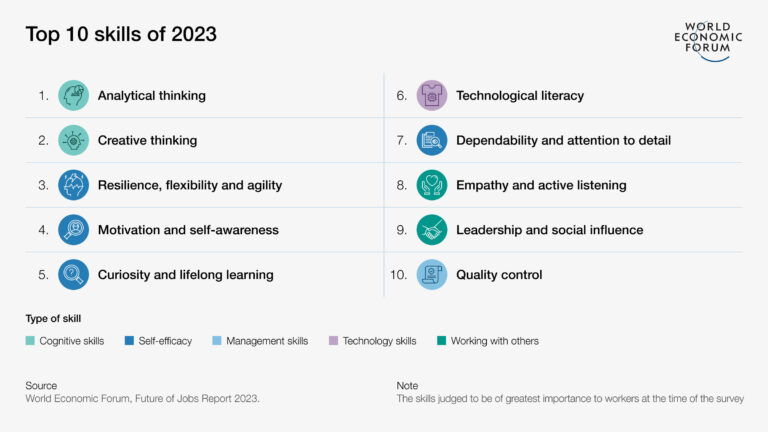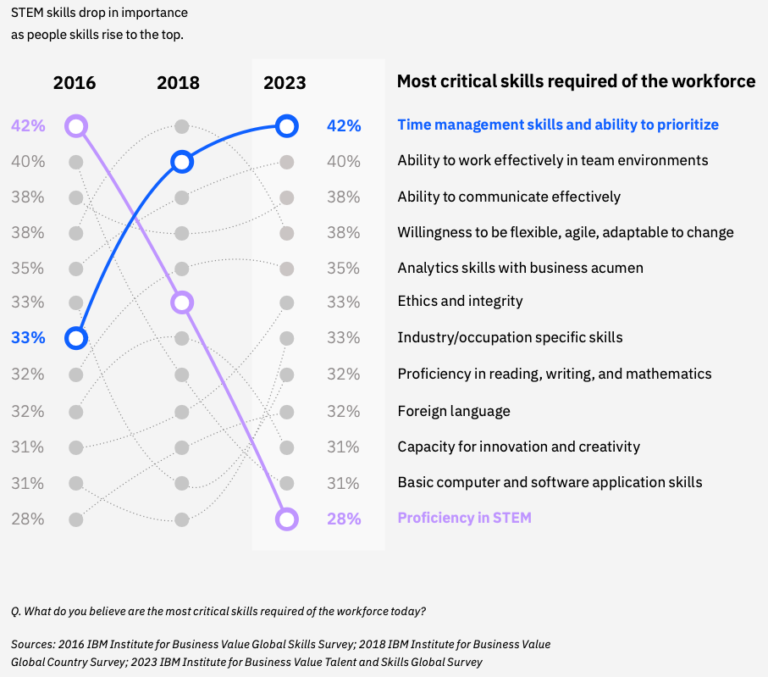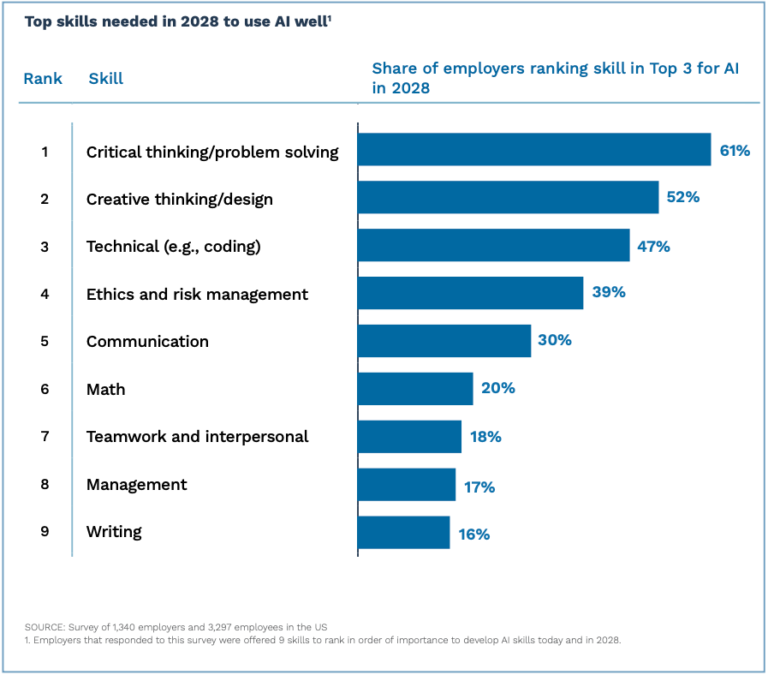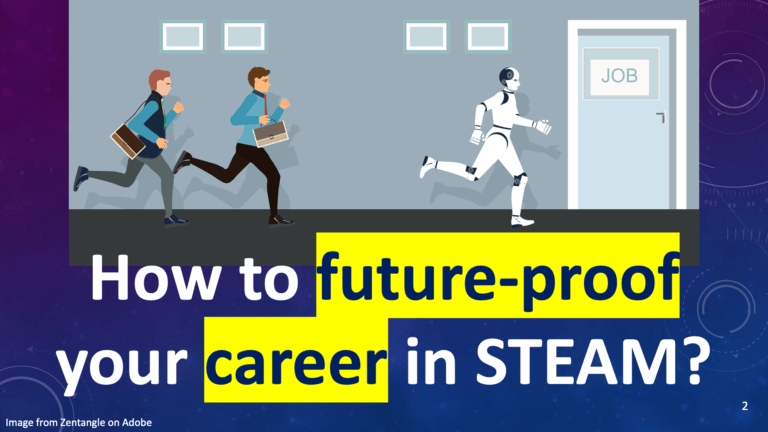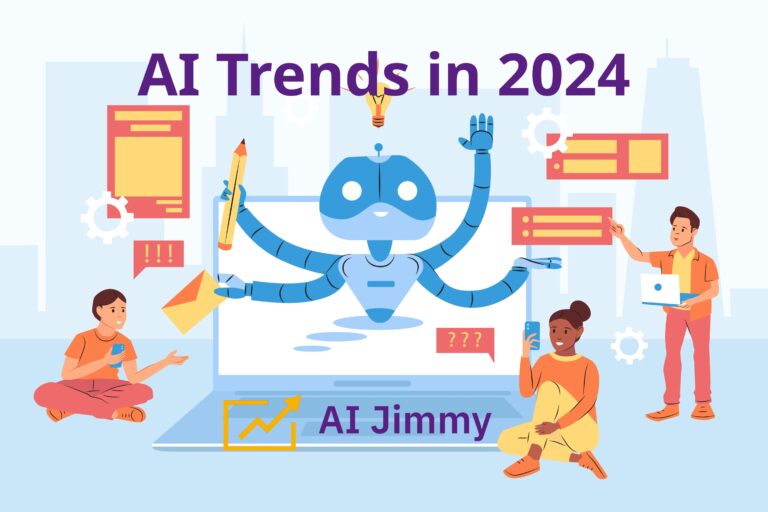Top 5 Valuable Skills to Future-Proof Your Career

You are wise to plan for the future. As AI gains more capabilities each year, the right skills that you grow now will give you more options and opportunities in your career in the future.
How would you choose which skills to future-proof your career? Should you learn software development to build AI systems? Or should you learn management skills to lead people? You’d certainly want to spend your precious time on the highest leverage activities, including learning the most valuable skills.
Skills Selection
Choose skills that will last a lifetime. Prioritize on things and activities that compound to grow exponential effects for you over time. Some skills are more useful than others.
What skills do you think will still be important to people 100 years from now? What skills were important to people 100 years ago? Those distinctly human skills will always be important to people no matter the changes in technology and society. Dale Carnegie studied people and summarized the value of timeless human communication and leadership skills.
“They came to me because they had finally realized, after years of observation and experience, that the highest-paid personnel in engineering are frequently not those who know the most about engineering. One can, for example, hire mere technical ability in engineering, accountancy, architecture or any other profession at nominal salaries. But the person who has technical knowledge plus the ability to express ideas, to assume leadership, and to arouse enthusiasm among people—that person is headed for higher earning power.”
― Dale Carnegie, How to Win Friends & Influence People
Research Into the Future of Work Augmented by AI
Even now in the new age of AI, think tanks, researchers, and employers all point to the importance of workers to develop key soft skills as AI augments technical capabilities.

Source: World Economic Forum “Future of Jobs” Report (April 2023)

Source: IBM Augmented World for an Automated AI-Driven World report (Sept. 2023)

Source: Amazon Accelerating AI Skills Report (Nov. 2023)
Top 5 Valuable In-Demand Skills to Learn in 2024
Future-proof your career with these valuable top 5 best in-demand skills that AI cannot replace:
- Prioritization Skills
- Leadership and Teamwork Skills
- Communication Skills
- Analytics and Critical Thinking Skills
- Agility and Creativity Skills
1. Prioritization Skills
As we’re always limited by resources and time, a perennial core skill is the ability to prioritize well. Businesses need workers at all levels, from executives to interns, to prioritize limited resources and time. Which projects to fund? Which budgets to slash? What do I work on today?
Ethics in society is also often a matter of prioritization and tradeoffs between competing interests and values. How do you prioritize different goals between different people and different needs, such as national security versus individual privacy?
Even when assisted with AI, we still need people to judge and prioritize good outcomes versus bad outcomes. Is that AI-generated image of a 6-legged dog an aesthetically pleasing artwork or an absolute abomination? Beyond art, AI designers face a life-or-death decision when they consider the trolley problem for self-driving cars.
Learn more: How to Make Prioritization Decisions
2. Leadership and Teamwork Skills
Wherever there are people, organizations value leadership and teamwork skills.
Both the global corporate executive and the neighborhood grassroots sustainability champion use leadership and teamwork skills. They both need to influence and collaborate with others to achieve something bigger than their individual selves.
You don’t need a manager job title to be a leader. In any case, you need to build trust to bring people along with you in a shared common vision. People trust people. Authenticity matters. AI can’t replace these human EQ and relational skills.
Learn more: 6 Leadership Skills You Need for Business Success
3. Communication Skills
Improve your ability to communicate with people to amplify your prioritization, leadership, and teamwork efforts.
Communication includes not just writing and speaking but also listening and empathy. Listen intently to others, including coworkers, customers, and collaborators, and they will consider you to be a skilled communicator.
Generative AI communication tools will uplift the baseline level of quantity and quality for everyone. A skilled communicator will still be essential for brands to rise above the noise. As the power of mass media shifts to millions of decentralized creators, each person is now a new channel, with ability to build their brand and influence in the world directly with followers.
Skilled communicators know how to use ethos, pathos, and logos from classical Greek rhetoric to persuade people. Generative AI will not automatically produce credibility and authenticity for people, but can assist those who use it effectively.
Learn more: ‘Soft skills’: The intangible qualities companies crave
4. Analytics and Critical Thinking Skills
The world today runs on data. The volume of data in the world will grow exponentially to 175 zettabytes by 2025 per IDC. Businesses need to sort through all that growing data for actionable insights to drive business outcomes.
All business functions, whether operations, R&D, sales and marketing, finance, IT, HR, or even legal, will need people with data skills. Basic data literacy will be expected of all workers, from nurses to paralegals to video producers.
Businesses will need descriptive, diagnostic, predictive, and prescriptive analytics to make sense of the collected data and to put them to good use.
Your analytics skills will combine with your prioritization, leadership and teamwork, and communication skills to demonstrate and optimize the best outcomes for the business. AI and other advanced data techniques can make data collection and processing easier, but we’ll still need people to interpret the data with critical thinking skills and to drive business relevance.
Learn more: What is Business Analytics? Core Skills and Career Paths
5. Agility and Creativity Skills
In an increasingly fast changing world, businesses need agility to respond to new market conditions. Employers expect 44% of workers’ core skills to change in the next five years per the World Economic Forum Future of Jobs Report (2023). Employers will value workers who embrace continuous learning with a growth mindset, and who are flexible to adopt new technologies, processes, and even roles.
Aside from agile learners, individuals who can lead during times of chaos will be indispensable to the business.
“The linchpin is an individual who can walk into chaos and create order, someone who can invent, connect, create, and make things happen. Every worthwhile institution has indispensable people who make differences like these.”
—Seth Godin, Linchpin
Beyond traditional functional work like engineering and marketing, enterprises will dabble and embrace new organizational structures relying on AI bots to perform creative tasks. Be ready for functional knowledge workers to transform into a new breed of product managers who use their prioritization, leadership and teamwork, communication, and analytics skills, and assisted by a virtual team of AI bots, to create new innovations for the company.
“New enterprises of the future may resemble a coalition of internal entrepreneurs who use virtual teams of AI agents to quickly develop products to serve new niches with the backing of the overall enterprise.”
—Jimmy Wong, AI Jimmy
Agility and creativity would be crucial for enterprises and solo entrepreneurs and individual workers to adapt quickly to ongoing business changes.
Learn more: The impact of agility: How to shape your organization to compete
My Personal Experience
Since the late 1990’s, I learned to build web apps using PERL, then PHP, then JavaScript, then Python, and now with no-code systems. My thick how-to books on each new programming language and framework quickly went obsolete. Software code can now be generated using ChatGPT and Copilots and other AI tools, using a natural language interface for prompt engineering. For me, each technical programming skill was needed for only a few years before new higher-level technologies became available.
Also starting in college, I accumulated business, leadership, and communication skills through leading clubs and volunteering in organizations. These soft skills enabled me to become a technical business manager. Ongoing learning in these areas, including volunteering and leading in Toastmasters clubs, allowed me to compound and grow valuable lifelong skills.
From my experience, certain skills are useful for short periods of time, while other skills grow in usefulness for an entire lifetime. I recommend you to build skills as a T-shaped or Pi-shaped professional to future-proof your career.
Final Thoughts
You must grow your skills in order to stay relevant in the fast-changing industry.
With AI increasingly being used for repeatable technical work, professionals must develop their soft skills such as empathy, communications, leadership, prioritization, and critical analysis in order to stay relevant.
We’ll always need people to prioritize problems worth solving and to dream up new ways to solve them. Launching those big ideas will also require people skills.
For all workers, pick in-demand skills that will serve you for a lifetime. Future-proof your career with these valuable in-demand skills today:
- Prioritization Skills
- Leadership and Teamwork Skills
- Communication Skills
- Analytics and Critical Thinking Skills
- Agility and Creativity Skills
Regardless of specific skills, cultivate a growth mindset for continuous learning. Always be learning, at any age.
Originally published on aijimmy.com. Feature image by Tierney on Adobe
We respect your privacy. Unsubscribe at any time.

